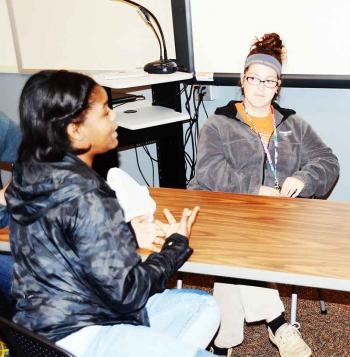
Morgan City High School 10th-grade civic students, from left, Joh’Nay Coulon and Mattie Carter discuss the new rules dealing with the gender identity of students. (The Daily Review/Shea Drake)
Students ponder new gender rules
In the midst of the debate over transgender rights in public schools, Morgan City High 10th-grade civic students chimed in on the national conversation that will affect them.
The U.S. Departments of Education and Justice issued letters requiring schools to grant rights — including a choice of restrooms — to children based on gender identity.
A multistate lawsuit says the Obama administration has conspired to turn workplaces and educational settings across the country into laboratories for a massive social experiment.
Two of the 10th-graders, students Joh’Nay Coulon and Mattie Carter, spoke on the record.
Carter does not feel comfortable with a transgender female using the same restroom as her. Safety is the No. 1 priority.
“Me personally, I cannot picture it,” Carter said. “There are so many things that could happen. It doesn’t matter if the person identifies themselves as a female or not. I’m sure they’re allowed to go wherever they want.
“If I walk my little self into the bathroom and some dude decides to follow me, my 4-foot-11 self cannot defend myself. So, what if he tries to rape me, assault me, hit me, anything? That’s what I’m worried about.
“I’m concerned about my safety if another male is allowed to follow me into the restroom. I’m not OK with it. And I just can’t see it happening. I really can’t. I mean, that’s just what I feel.”
Although Carter, 16, is in high school, she is very concerned about children in elementary school.
“I feel like there are way too many things that can happen, especially around our age,” Carter said. “And you have to think about the elementary students, like what is a little girl going to think of when a little boy follows her into the bathroom.
“She’s going to be scared. That’s just what I’ve been thinking about.”
The idea of going to the restroom with a transgender student for Coulon , also 16, incites the feeling of awkwardness.
“I’ve never witnessed that or had to go through that before,” Coulon said. “I feel it would be, because it’s new, it’ll be awkward. And I feel like there is a possibility this can happen because of the day and age we live in.
“Everyone is striving for equality. Trans want to be accepted. I just feel like if it happens, it would be awkward.”
As for safety, Coulon does not deny that she would probably have an eye out for a transgender student going to the restroom with her. But she also believes safety concerns should not be limited to a specific group of people.
“Say you’re in a public restroom at the movies or something and I walk in,” Coulon said. “There’s a female that also walks in and she’s an adult.
“There’s a danger in that, too. You never know what this person is holding in their purse or in their back pocket. There’s always going to be that danger because there’s no security guard or metal detector to walk through.
“Anybody can harm you. Everyone has the power to harm someone or one another.”
When asked if the federal government’s guidance letter to schools was a help or hindrance for transgender rights, Coulon says a transgender student could best answer that question.
“I feel you would never know until you get a trans-person’s view of it,” Coulon said. “I can’t really put my opinion in on this question because I don’t know how it would feel.
“I would have to get a trans-person’s point of view on how they would feel if privacy is best left in the dark or is it better to be in the limelight.”
Carter has a simpler fix, just go to the bathroom.
“I don’t understand why it needs this much attention in the sense of the federal government …,” Carter said. “I mean, if you’ve got to go to the bathroom, then go to the bathroom.
“If I did know that someone was transgender in the bathroom, I would probably just not use the bathroom.”
The guidance letter stemmed from questions by school districts, colleges and universities about how to best provide safe and discriminatory-free environments for transgender students, federal agencies said.
“I feel like this came about because it’s been around,” Coulon said. “But we’re more vocal now with the trans-population and just the human population and all.
“Women’s bathrooms, men’s bathrooms, handicap bathrooms, I just feel like they want to be equal.”
“They want to stand up for what they believe in,” Carter said. “They don’t want to stay quiet anymore. They are tired of being put down.”
- Log in to post comments
